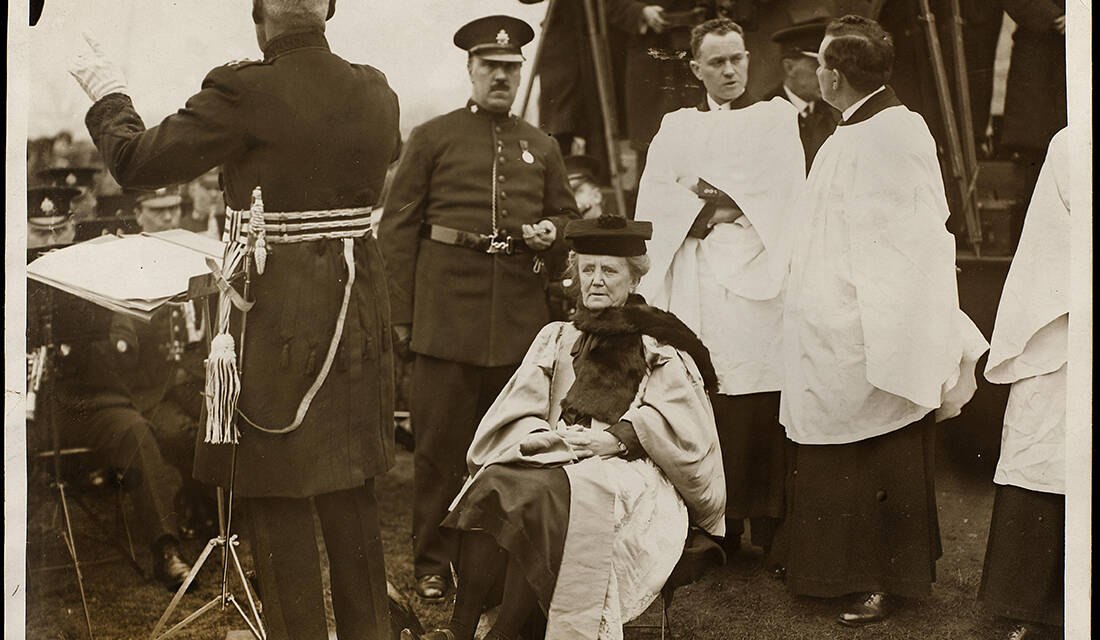Name: Ethel Smyth
Born: 22 April 1858
Died: 8 May 1944
Place of birth: Sidcup, Kent
Known for: English composer and a member of the women’s suffrage movement, the first female composer to be granted a damehood.
Career
Dame Ethel Smyth was a prolific composer. She wrote several operas, a ballet, choral and orchestral works, a concerto, chamber music and works for piano, organ and brass and voice.
Her father was against her making a career in music; however, she defied convention and stood up to him. She must have been successful in this as, at 17 years old, she was allowed to study privately with Scottish musician and composer Alexander Ewing.
She continued her musical education at the Leipzig Conservatory and privately again under Austrian composer and conductor Heinrich von Herzogenberg. It was during this period that she met some of the most significant composers of the day, including Brahms, Dvořák, Clara Schummann and Tchaikovsky.
Smyth was composing as early as 1880, when she was just 22. However, as a woman, she struggled to get her works published during her lifetime. While many critics recognised her talent, she also had a lot of detractors. She was never considered as simply a composer, instead being referred to as a ‘lady composer’. Her more powerful works were criticised for being too masculine for a woman, but when she wrote more delicate pieces she was charged with not measuring up to her male counterparts.
Despite this, Smyth fought to have her music published and performed. She wrote six operas that were performed across Europe and North America. Her one-act opera Der Wald (The Forest, 1902) was performed at the Royal Opera House to great success. Smyth also co-wrote the libretto, along with her long-term collaborator and staunch supporter – and sometime lover – Henry Brewster. The opera was mounted at New York’s Metropolitan Opera in 1903, becoming the only opera by a female composer produced there for more than a century. She also performed for Queen Victoria.
Smyth became increasingly deaf from 1912 and stopped composing in 1930. However, after this she turned to writing essays and memoirs, telling the story of her life in her eight-volume autobiography Impressions That Remained. In 1922 she was awarded a DBE for services to music, becoming the first female composer to be awarded a damehood, and in 1926 she became the first female recipient of an honorary doctorate in music from Oxford University.
Personal life
Ethel Smyth was born on 22 April 1858 in Bexley, Kent. She was the fourth of eight children. Her father, John Hall Smyth, was a major general in the Royal Artillery.
In 1910 Smyth met Emmeline Pankhurst, one of the founders of the English suffrage movement and head of the Women’s Social and Political Union (WSPU). Smyth became very active in the suffragette cause, even taking two years out of her musical career to support women’s rights. In 1911 she wrote the song ‘The March of Women’, which became the official anthem of WSPU.
In 1912 she served two months in London’s Holloway Prison for throwing rocks through the windows of the Houses of Parliament, an act of protest organised by Pankhurst. The latter and 100 other suffragettes were also imprisoned. When Smyth’s friend Thomas Beecham, a composer and impresario, visited her in prison he found her conducting her fellow suffragettes in a performance of ‘The March of Women’ – using a toothbrush.
Smyth never married, claiming both that it would end her chances of a musical career and that she was too independent. However, she did maintain a long-distance, long-term relationship with Thomas Brewster and had many passionate affairs throughout her life, mostly with other women.
She was a keen horse-rider, tennis player and golfer. Smyth died on 8 May 1944, less than a month after her 86th birthday. Her ashes were scattered in the woods next to the Woking Golf Club, of which she was a member.
Did you know?
Smyth was briefly engaged to Willie Wilde, Irish journalist and poet, and older brother of Oscar, after he proposed to her during a train journey.
Best-known works
Smyth’s works remain under-appreciated; The Wreckers, a 1906 opera telling the story of an insular Cornish fishing community, is among her best-known works. Glyndebourne is set to mount its first production of the piece in its 2022 festival.
Image
Dame Ethel Smyth at the unveiling of Emmeline Pankhurst’s statue, in London, 1930. Smyth conducted the Metropolitan Police Band in a performance of ‘The March of Women’ (LSE Library via Wikimedia Commons).

